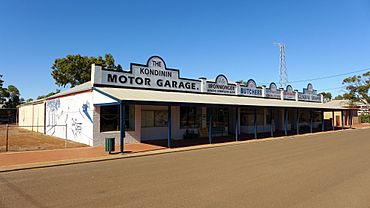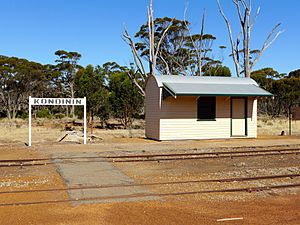Kondinin, Western Australia facts for kids
Quick facts for kids KondininWestern Australia |
|
|---|---|

A row of historic shops in Gordon Street, 2014
|
|
| Established | 1900s |
| Postcode(s) | 6367 |
| Area | [convert: needs a number] |
| Location | |
| LGA(s) | Shire of Kondinin |
| State electorate(s) | Wagin |
| Federal Division(s) | O'Connor |
Kondinin is a small town in the eastern Wheatbelt area of Western Australia. It is about 279 kilometres (173 miles) east of Perth, the state capital. You can reach it by driving on the Brookton Highway and State Route 40.
Kondinin is one of three towns in the Shire of Kondinin. In 2006, about 311 people lived there.
Contents
A Look Back: Kondinin's History
Early Explorers and First Peoples
The first European to visit the Kondinin area was Captain John Septimus Roe. He was the Surveyor General of the Swan River Colony, which was an early settlement in Western Australia. He explored the area in 1848–1849.
During his trip, he met a group of Aboriginal people. They helped guide his group to water sources. They left the explorers at a place called Yeerakine, near Kondinin. This was the edge of their traditional lands.
The nearby lake and well became known as Kondinin. No one is sure what the name "Kondinin" means.
Life for Early Settlers
When early settlers arrived, they sometimes saw Aboriginal people hunting possums. People have found old tools like grinding stones in the area. These show that Aboriginal people lived and used the land.
However, early settlers did not find signs of permanent homes. They only found temporary shelters called mia-mias. These were built by Aboriginal shepherds who worked for a businessman named Michael Brown.
Michael Brown was from Narrogin. In 1905, he leased large areas of land in the Kulin/Kondinin region. These land leases were ended around 1909–1910. This allowed the government to divide the land for farming.
The Town Begins to Grow
The town of Kondinin started because of a railway line. The railway line ran from Yilliminning to Kondinin. It was built between 1911 and 1915.
Even before the railway, people had already settled in the Kondinin area. The government decided to build the railway here in 1911. The townsite was officially named in 1915.
In 1949, the town had a very good farming season. The bulk wheat bin in Kondinin and another nearby were completely filled. This happened even though the area had only 10 inches (250 mm) of rain the year before.
Kondinin Today
A Farming Community
Today, Kondinin has about 300 people. It is an important centre for farming. The main activities here are growing wheat and raising sheep.
The town has a TAFE centre, which is a place for vocational training. There is also a primary school. The closest high school is 23 kilometres (14 miles) away in Kulin.
Kondinin also has banks, shops, and places to stay like a hotel and caravan park. The local council offices are here, along with a telecentre. A telecentre is a place where people can use computers and the internet.
The town is also a stop for the Transwa bus service that goes to Esperance.
Grain and Farming Innovation
The farms around Kondinin grow wheat and other cereal crops. The town has a receival site for Cooperative Bulk Handling. This is where farmers bring their grain to be stored and transported.
Kondinin is also known as the "Home of the Group." This refers to the Kondinin Group. It is a special group that helps farmers improve their farms. It started in Kondinin in 1955.
The Kondinin Group helps farmers learn about farm machinery. It grew a lot in the 1990s. Now, it has about 10,000 members across Australia. These members are mostly large-scale crop and livestock farmers.
Research shows that the Kondinin Group has really helped farmers change their practices. Farmers often prefer the Kondinin Group for reliable information. They trust it more than consultants or government departments.
The Kondinin Group also has an online bookstore. It sells guides on farming skills and agricultural industries. They also publish a magazine. These are ways they share their research and training.
Kondinin has had a big impact on farming across Australia. It is even known around the world for its influence on agricultural extension. This is why the group still uses "Kondinin" in its name.
Local Landmarks
You can also find the Centenary of Women's Suffrage Gazebo in Kondinin. This gazebo celebrates 100 years of women having the right to vote.
 | John T. Biggers |
 | Thomas Blackshear |
 | Mark Bradford |
 | Beverly Buchanan |



